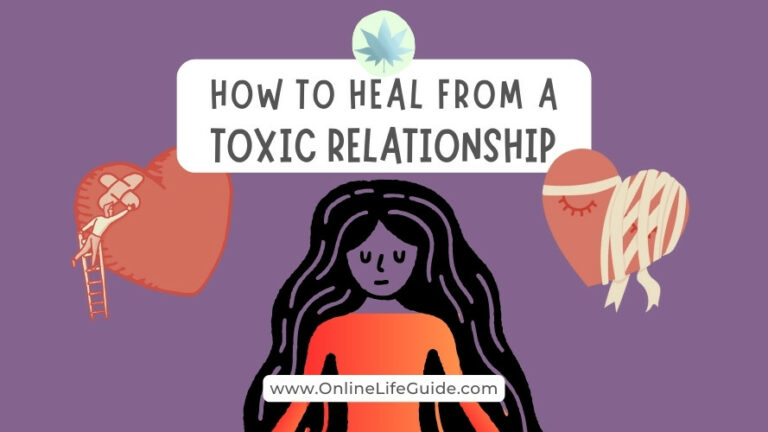10 Worst Signs of Unhealthy Boundaries in a Relationship
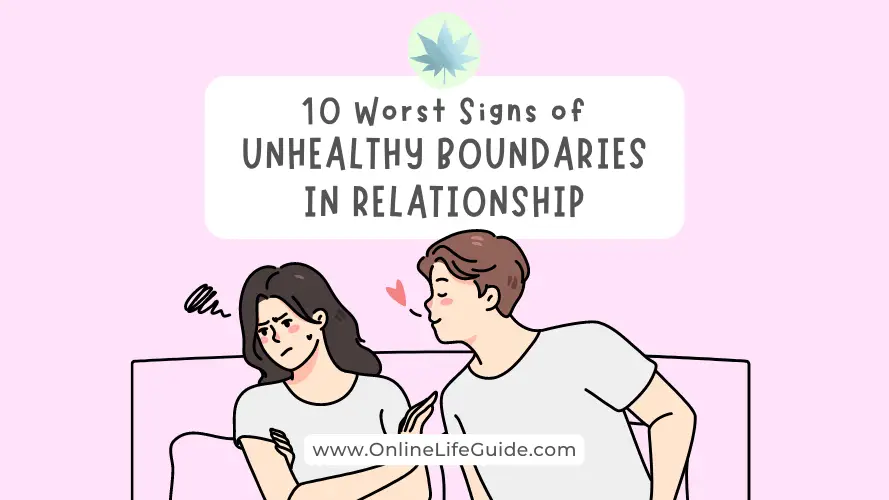
Rebecca and David had been married for five years. From the moment they met, they were inseparable. They obsessed over each other’s quirks and qualities, and spend as much time together as they could.
But as time went on, their relationship started to become suffocating.
They became enmeshed to the point where they couldn’t differentiate between each other’s wants, needs, and feelings. What one of them wanted or felt, they would expect the other to want and feel the same.
Rebecca couldn’t say “no” to any of the demands David made, whether it was going out to the movies even when she was utterly tired or cleaning the apartment together when she just wanted to have some me-time.
David, on the other hand, struggled with a lack of personal responsibility. He totally depended on her to take care of things which led to her feeling overwhelmed and frustrated at times.
The lack of privacy between them made them crave each other’s attention throughout the day. Constantly calling and texting each other during work hours was a big distraction that at times put a strain on their professional life.
Even when they would try to balance things out in their relationship, they would just end up feeling guilty for setting limits or feeling resentful for being told what to do.
Despite their obvious attraction and love for each other, their relationship struggled due to poor boundaries and the unhealthy relationship dynamic that was created because of it.
If you resonate with any part of Rebecca and David’s relationship, you’ll find a lot of insights, practical examples, and possible solutions to deal with poor boundaries in this in-depth guide.
Grab a cup of coffee and read on!
What are Unhealthy Boundaries in Relationships?
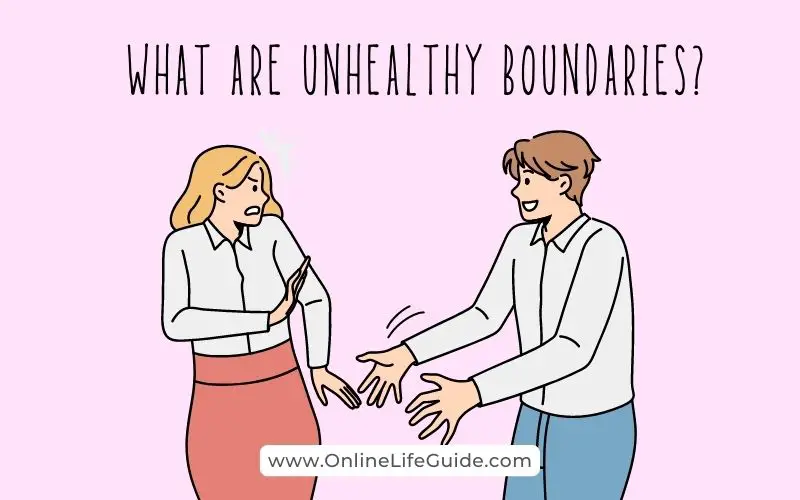
Boundaries are social rules that define a person’s individuality, autonomy, personal space, privacy, and freedom of choice regarding different areas of life.
They define what is and isn’t acceptable behavior as well as establish a sense of respect and trust in the relationship.
Healthy boundaries allow us to embrace our own sense of self while also sharing a deep and meaningful connection with the other person. This is the essence of a fulfilling relationship.
The health of our relationships, whether it be with our friends, parents, children, or spouse, heavily relies on how well we set boundaries.
Emotional Intelligence also plays a huge role in our ability to maintain and respect boundaries. A person who has high emotional intelligence will have more awareness and control over his/her own boundaries while also being mindful of others’ boundaries, as compared to someone who has Low Emotional Intelligence.
When it comes to romantic relationships, healthy boundaries lead to stronger bonds by allowing partners to:
- Have mutual respect
- Maintain individual identity and independence
- Establish a sense of stability
- Feel safe in the relationship
- Healthy and open communication without fear of rejection or judgment
- Deep trust and understanding that keeps on growing with time.
On the other hand, poor boundaries lead to the opposite:
- Resentment
- Manipulation
- Guilt
- Controlling behavior
- Disrespect
- Feeling like you don’t have any identity of your own
- Feeling suffocated
What Causes Poor Boundaries
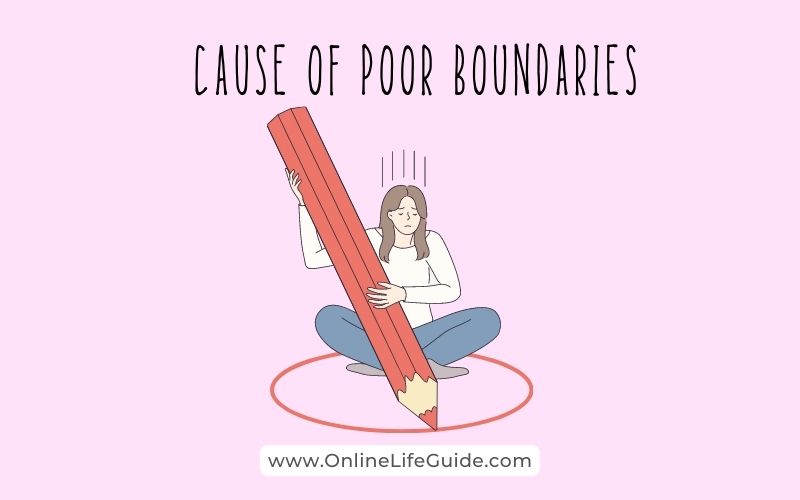
A variety of factors can contribute to having poor boundaries. Here are some common causes of poor boundaries in relationships:
a. Lack of Self-Awareness
The most common reason for the lack of boundaries is the lack of awareness. Most people don’t even know what their boundaries are. They don’t realize that their needs, individual identity, and personal choices deserve to be respected.
b. Codependency
Codependency is an imbalanced relationship dynamic when one person in the relationship assumes total responsibility for their partner’s moods and feelings to an unhealthy extent. Or on the other hand, a person who has an excessive psychological and emotional dependency on their partner.
c. Fear of Rejection or Abandonment
Some people fear setting boundaries because they are afraid of pushing their partner away and creating a distance in the relationship.
d. Lack of Communication
Long-term relationships rely on the couple’s ability to have open and honest communication to sort things out and clear the air during difficult situations.
Boundaries NEED to be communicated properly (which we’ll discuss in a bit). Inadequate communication only leads to resentment and misunderstandings.
e. Childhood Experiences
Lack of affection, abuse, or enmeshment issues with a parent during childhood can severely impact an individual’s ability to set and respect boundaries in their romantic relationships.
f. Societal Conditioning
Some people grow up in environments where there is no such thing as boundaries. They never learned what healthy boundaries are, and setting boundaries for themselves or respecting other people’s boundaries seems weird and alien to them.
Signs of Poor Boundaries (with Examples)
Since unhealthy boundaries can cause a variety of issues in relationships, it’s important to thoroughly understand and recognize the telltale signs of poor boundaries so you can address them with the right approach.
1. Difficulty Saying “No”
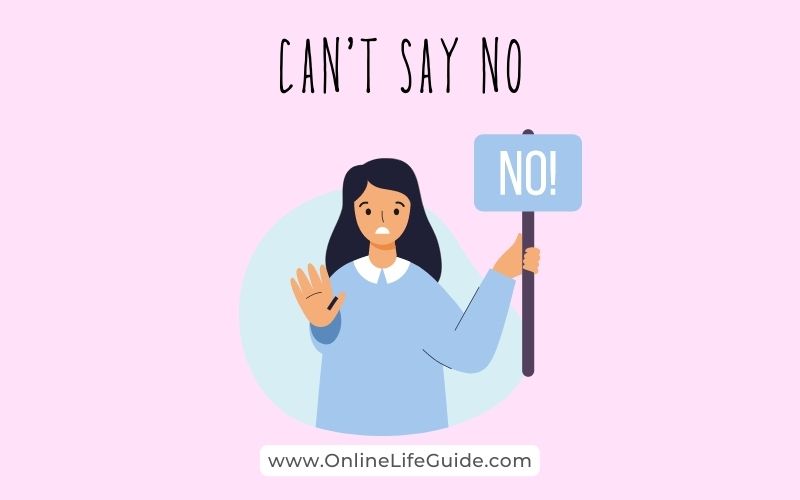
- Do you often find yourself feeling obligated to do things that aren’t actually your obligation?
- Do you feel guilty for holding your ground, standing up for your right, and setting limits?
- On the other hand, do you find it difficult to take a “No” from your partner? Do you feel offended when your partner refuses to do something?
One of the first signs of poor boundaries is the difficulty to say or accept “no”. People with poor boundaries struggle to decline something that they don’t wanna do or respect someone else’s choice for not doing something.
They sacrifice their own individuality and personal needs because subconsciously they seek to please (or are afraid to displease) the other.
However, we all have a certain limit to how much we can give before we reach mental and emotional burnout.
People who give too much to please other people eventually end up feeling underappreciated. They feel like the other person isn’t reciprocating their kindness and generosity.
Overtime time, this leads to resentment and feeling like they’re being taken advantage of.
Saying “no” in intimate relationships can be difficult at times, but it’s important for us to learn to say “no” when necessary to maintain a healthy and fulfilling relationship with our spouse in the long run.
Examples of Poor Boundary
- Agreeing to spend the weekend with your partner’s family even when you have an overwhelming amount of work to do.
- Not being able to gently refuse your partner’s request to go out even when you’re super tired and need some me-time to recharge.
- Not being able to decline your partner’s request to buy something when you know you can’t afford it.
2. Lack of Privacy
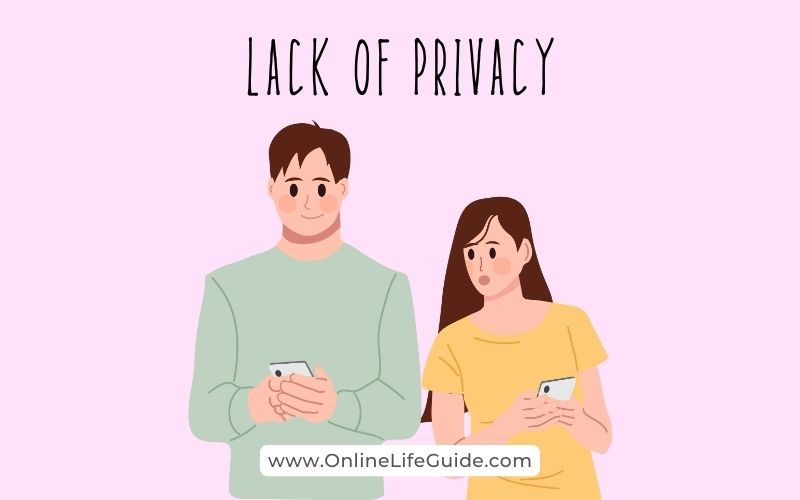
When there is a lack of privacy in the relationship, you constantly need to know about your partner’s activity throughout the day, where they go, what they do, and who they interact with.
There is also a constant urge to check your partner’s phone and digital activity.
For a lot of people, this might seem like a natural thing to do in a relationship, but in reality, this stems from a place of mistrust and insecurity, which, in the long run, creates an unhealthy dynamic of constantly monitoring and controlling the other person.
It’s important to keep in mind that personal privacy doesn’t mean hiding something from your partner. It’s a basic human right to have some things to yourself.
(Please note that here we are not talking about genuine trust issues that originate from infidelity or any fishy and unusual behaviors.)
Examples of Poor Boundary
- Sharing passwords to all your social media and emails with your partner even when there is absolutely no need to.
- Reading each other’s personal journal or diary without permission.
- Not having private and dedicated space for your personal items and activities in your home.
3. Lack of Personal Responsibility
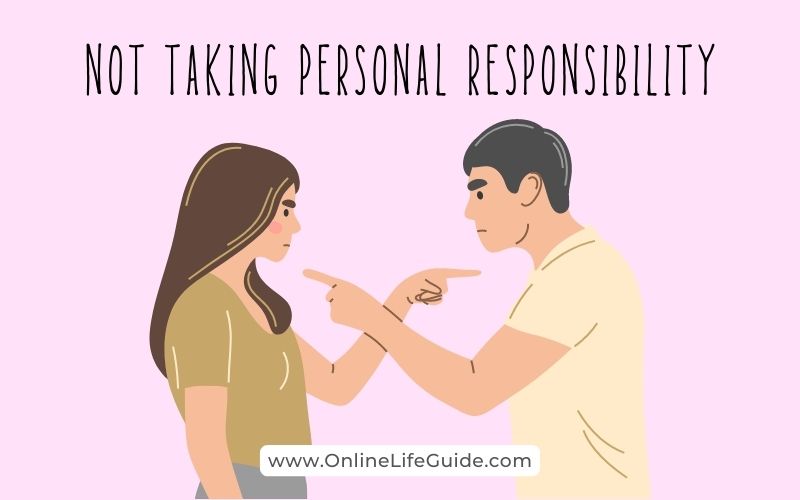
Poor boundaries can often lead to people blaming each other for all the problems in the relationship, instead of taking personal responsibility for their own actions.
Since the lack of boundaries can often lead to enmeshment, the people in such relationships end up feeling as if their partner is fully responsible for their moods and problems within the relationship.
Playing the blame game is just banging the head against the wall. You don’t get anywhere.
This is the biggest consequence when there is a lack of personal responsibility in the relationship. It stunts the growth of the relationship.
Since nobody is willing to take ownership of their actions and work on improving themselves and the relationship, things just stay stuck or get worse by the day.
That is the reason in a lot of my guides on relationships, I focus on “playing your part and putting in your share of efforts”.
Even if one person in the relationship starts taking some charge, it often gets the ball rolling and eventually inspires the other person to do the same (as long they are a good person and have the desire to improve their marriage).
(Please note that taking personal responsibility DOES NOT mean taking all the blame for everything. It’s about taking responsibility for your own actions and doing your share to improve the relationship.)
Examples of Poor Boundary
- Blaming each other for all your problems.
- Not taking responsibility and ownership for your actions and behaviors.
- Not willing to change and grow.
- One person in the relationship tackles all the difficult tasks and decisions while the other remains passive.
4. Constant Need for Attention
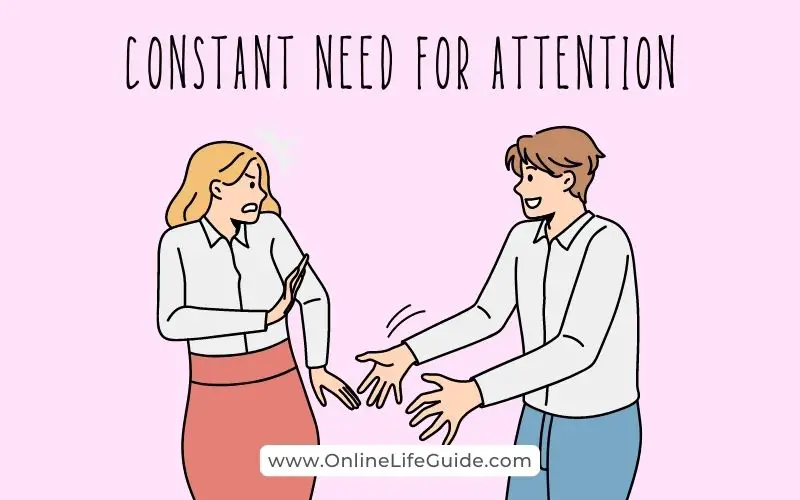
People with a poor sense of boundaries seek constant validation and attention from their partner, and when they don’t get enough of it, they become jealous, possessive, and resentful which can get quite draining for the other partner.
This stems from psychological dependency (mentioned earlier) and is simply a recipe for a toxic relationship.
Spending some time apart is not a sign of a lack of intimacy or a weak bond. It’s in fact necessary for the mental health and well-being of both people involved.
Examples of Poor Boundary
- Feeling the need to be with your partner 24/7
- Constantly calling and texting your partner throughout the day even when they are busy and need to focus on other things.
5. Use of Manipulative Tactics
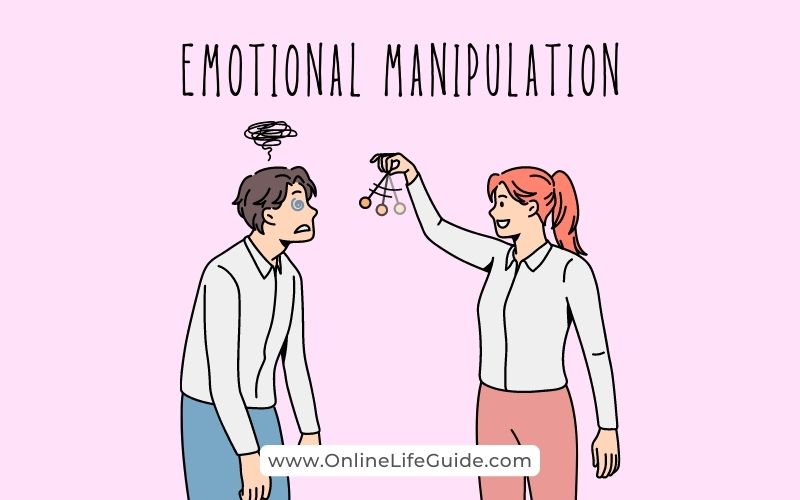
People use manipulation to get what they want from someone which might not necessarily be something that the other person wants.
There’s a difference between trying to convince someone of something and trying to manipulate them. You are not trying to play with your partner’s psychology when you’re trying to convince them.
Not respecting the will and feelings of your partner and trying to get them to do something through mental or emotional manipulation is a major boundary violation.
Examples of Poor Boundary
- Comparing their partner with someone else to get them to do the same thing as the other person does.
- Going out of the way to do favors only to ask a favor in return.
- Using passive-aggressive or indirect remarks when the partner doesn’t comply with their demands.
6. Projecting Yourself onto Your Partner
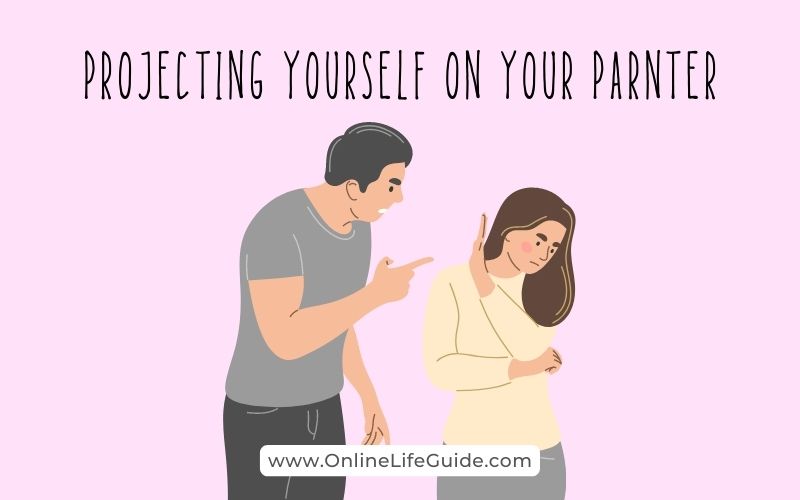
Couples with poor boundaries are constantly trying to change each other. They want their partner to be just like them, to do things as they do, to think as they think, and to have the same priorities as them.
This is not just a lack of boundaries but also a lack of respect for the other person’s individuality.
It’s natural and okay to give constructive and beneficial suggestions at times in a kind and sincere manner. It is also good to push each other to grow and improve. It’s not the same as projecting yourself, your thoughts and opinions, and your feelings onto the other person.
Examples of Poor Boundary
- Criticizing the mannerism of the other person. The way they talk, express, walk, etc.
- Constantly saying things like “I do it this way, you should too.”
7. Lack of Personal Space and Time
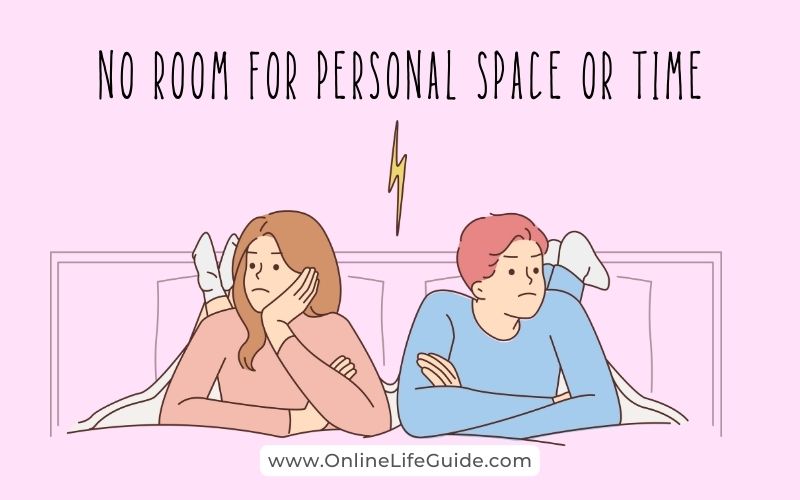
If your partner expects you to spend all your spare with them or you just simply feel obliged on your own to give all of your time and space to your partner, you certainly have boundaries and enmeshment issues (check out my guide on signs of enmeshment to get a better understanding of what enmeshment is and how it develops).
We all need some time by ourselves in our own little cave to sort our minds out and recharge our batteries from time to time. Some need it more than others.
A lot of people’s mental health gets ruined just because they didn’t have any time for themselves.
Your body needs your time. Your mind needs your time. Your soul needs your time. All of these aspects of your being require regular care and maintenance.
Self-care is not an optional luxury. It’s a necessity if you want to live a happy and healthy life and have a flourishing relationship.
Examples of Poor Boundary
- Not being able to have some time for yourself.
- Not being able to indulge in self-care activities or have other hobbies and interests outside of your relationship.
- Not giving each other personal space to blow off steam and relax after an argument or a challenging situation.
8. Difficulty Maintaining Healthy Relationships Outside of Marriage
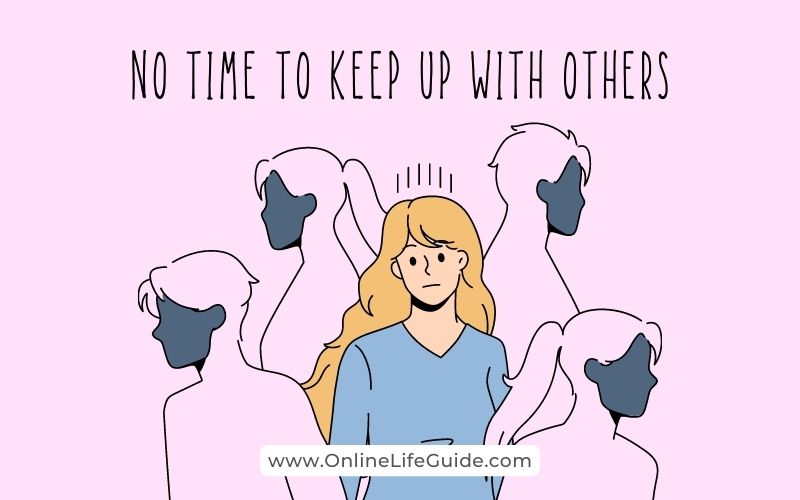
Do you feel like you cannot have a social life after marriage?
Have you become isolated from your friends and relatives?
Do you feel like you have absolutely no time or space to talk to your friends and attend gatherings?
Now, of course, it’s natural to get a bit busy building our own family. Our priorities change. We simply cannot hang out with friends every weekend like we used to.
But getting isolated and losing touch with your close friends and relatives indicates that you might need to balance your life out a little for the sake of your own well-being.
Examples of Poor Boundary
- Losing touch with relatives and friends because all your time is spent with your partner.
- Feeling insecure when your partner spends time with family or friends.
- Not getting time or space to meet new people from time to time and form new connections and friendships.
- Constantly having to choose between your significant other and your friends or relatives.
9. Inability to Respect Boundaries Set by the Other Person
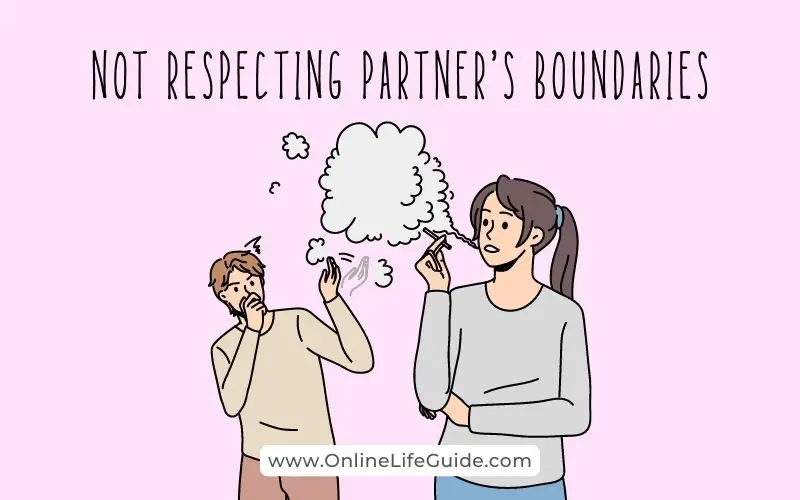
Some people are good at setting boundaries for themselves but have no regard for the other person’s boundaries.
I’m sure you’ve met such people at some point who won’t let you in their personal matters but would gladly intrude in yours. They expect you to open up to them but won’t open up to you about themselves.
Dealing with a partner who won’t respect your boundaries even when you set them can be a different challenge than just having a lack of boundaries and deserves its own separate guide (coming soon!).
Example
- Intruding and not respecting your partner’s need to have time by themselves even when they have clearly requested some space.
- Not respecting your partner’s boundaries around finances and their professional life.
- Not involving your partner in important decisions that should be taken mutually, and disregarding their opinions and feelings about an important matter.
10. Constantly Feeling Guilty or Resentful
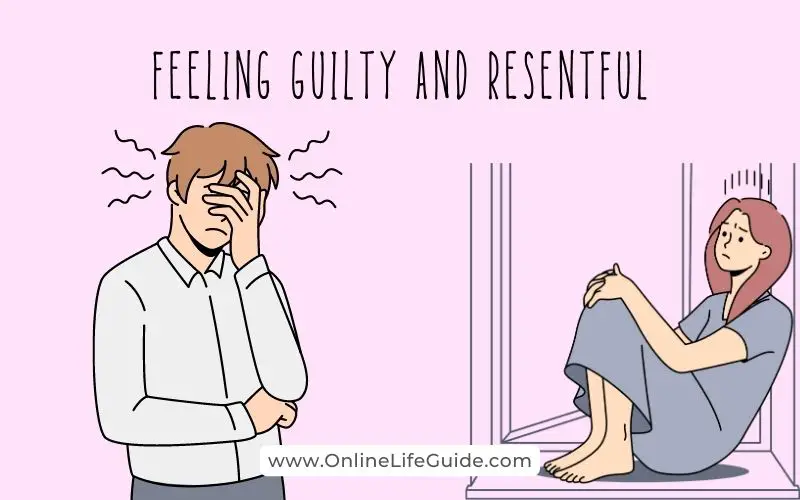
The people-pleasing side of us feels guilty when we try to be assertive and set firm boundaries even though it’s our right and there is nothing wrong with it.
The people pleaser within us is simply programmed to not do anything that has even the slightest chance to displease someone or cause any sort of friction because subconsciously we are afraid of confronting someone and then facing the consequences that come with it.
Guilt also comes from feeling inadequate as a partner. Feeling like you are not doing enough for them or that you are not meeting your partner’s needs and expectations.
Resentment, on the other hand, develops when your boundaries are constantly crossed.
It makes the relationship itself almost bipolar. One moment you feel like you should do more and give more, and the next moment you feel like being taken advantage of or not receiving enough from your partner.
It requires consciously retraining our minds by practicing some assertiveness and taking a stand for ourselves.
Examples of Poor Boundary
- Feeling like you are the one who is always compromising and that your partner is not reciprocating back.
- Feeling guilty for taking a stand or expressing your own needs that go against your partner’s wishes.
- Being resentful toward your partner for not fulfilling your wants and needs.
11. Inability to Assert Oneself
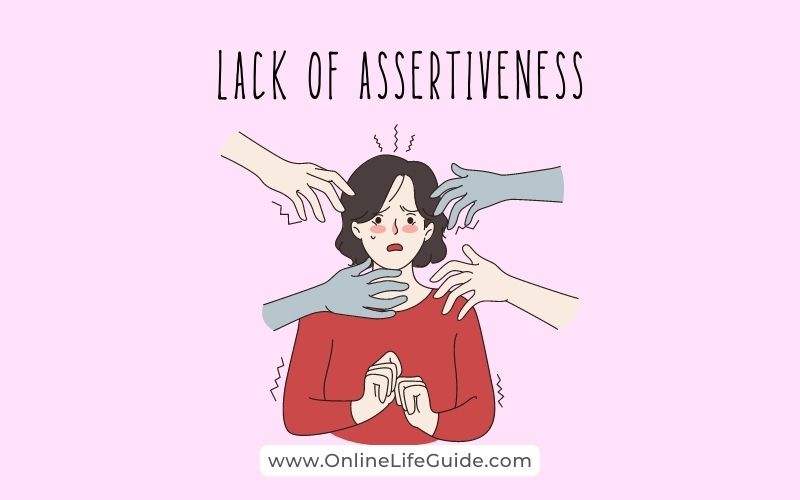
Assertiveness is sometimes misunderstood as being rude, inconsiderate, and dominant but in essence, it’s more about being able to express your needs, feelings, opinions, and wants in a clear and concise manner while also being open to listening and respecting others’ wants and feelings.
If you feel like you’re constantly giving in to your partner’s needs and wants, and find it difficult to express what YOU want and need, you might want to work on developing some assertiveness.
Sometimes our partner unknowingly pushes and pressures us into things we aren’t comfortable with because they aren’t even aware of what we want and need. How would they know, we’ve never fully expressed ourselves!
Examples of Poor Boundary
- Not being able to express your opinions and speak your mind on important matters.
- Not actively participating in decision-making or resolving conflicts in the relationship and just passively riding the wave.
12. Allowing Oneself to be Treated Poorly
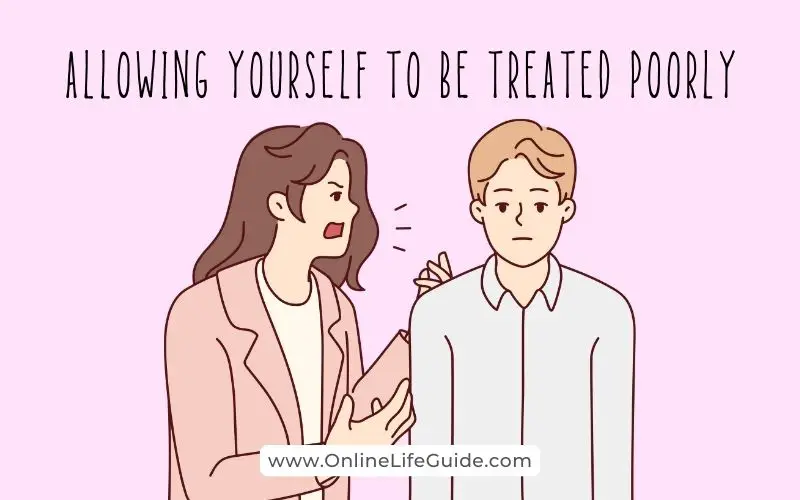
The absence of clear boundaries can lead to a person allowing themselves to be treated in unacceptable ways i.e. verbal abuse, emotional manipulation, and even physical abuse.
This stems from having low self-esteem and leads to further degradation of one’s self-esteem and self-respect. No one, under any circumstances should allow themselves to be mistreated and abused.
Low self-esteem also makes one think that they don’t deserve respect. People often stay stuck in abusive relationships and keep tolerating mistreatment because they are afraid of being lonely and think they won’t find a better partner afterward.
Examples of Poor Boundary
- Allowing your partner to cross your boundaries repeatedly.
- Accepting mistreatments such as being constantly criticized, being yelled at, passive-aggressive remarks, and toxic language.
- Not leaving a toxic relationship even when it’s clearly causing harm to your mental and physical health.
Effects and Consequences of Poor Boundaries
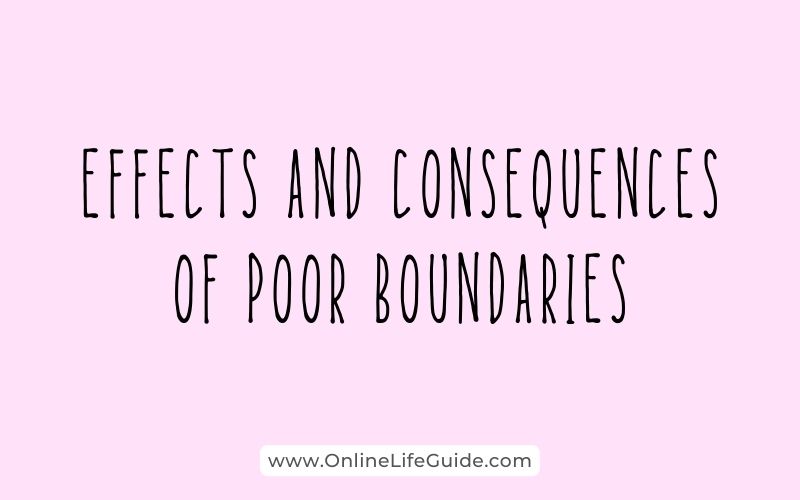
Though the effect of poor boundaries can manifest in dozens of ways in a person’s life, here are some of the most common consequences:
Damage to Self-Esteem
Lack of boundaries leads to low self-worth. People with poor boundaries don’t value their time and mental well-being enough.
Moreover, they begin to internalize their partner’s negative behaviors such as getting blamed for everything and beginning to believe every negative remark as truth.
Damaged self-esteem usually has a ripple effect on other areas of life which leads to a general sense of hopelessness, depression, and lack of motivation.
Self-esteem issues, if not fixed internally, can make it difficult to form healthy relationships in general and can lead to a cycle of unhealthy relationships in all areas of life outside of marriage.
Loss of Independence
Enmeshment, codependency, and relying on their partner for emotional support, decision-making, and validation, can make an individual heavily dependent on their partner.
Difficulty Trusting Others
Constant violation of boundaries and invasion of privacy can make a person closed off in order to protect themselves.
They find it hard to open up with their partner and be vulnerable about important things because they don’t trust that their partner will respect and honor their feelings.
Damage to Other Relationships
When you are constantly preoccupied with your romantic relationship (because of a lack of proper boundaries) you run the risk of neglecting other close relationships in your life.
The negative effects of poor boundaries on an individual’s moods and mindset can negatively impact other relationships. They might project built-up frustration and anger onto other people in their lives, weakening the bonds and pushing them away.
Increased Stress and Anxiety
Needless to say, a constant state of turmoil and frustration isn’t a very pleasant state to be in.
Exhaustion, burnout, feeling drained, anxiety, and even physical symptoms such as insomnia, stomach problems, and headaches can all result due to having unhealthy boundaries in the relationship.
Difficulty in Having Healthy Communication
Feeling afraid of confrontation, inability to say or take “no” for an answer, not wanting to take responsibility, and putting blame on the other instead can lead to serious communication issues which if not resolved timely, will lead to misunderstandings and further conflicts.
How to Fix Poor Boundaries
It’s never too late to start working on your relationship as long as both people have the will to improve.
To keep the length of this guide manageable, I will briefly go through some key points on fixing poor boundaries, however, you can find the full step-by-step guide on How to Set Healthy Boundaries in Romantic Relationships right HERE.
If you’re struggling with boundary issues, I would highly suggest you go through that guide as it will help you gain a clear understanding of:
- What different types of boundaries are
- How to set and maintain boundaries
- What to do when your boundaries are violated
1. Communicate with your Partner
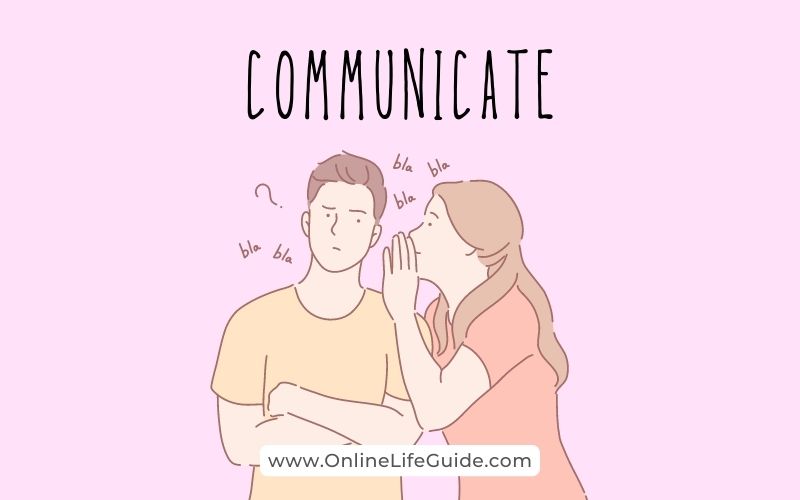
Some boundaries are set non-verbally with action, hints, and behavioral cues. Whereas other boundaries need to be verbally communicated with clarity and surety.
It’s usually better when you start setting boundaries non-verbally first before you communicate verbally to let the other person know in advance that something is up.
Practically taking action and standing your ground puts you in a confident state.
After you’ve mentally decided what your boundaries and red lines are, pick a suitable time to have a discussion. Tell your partner that you wanna talk about something important.
When communicating, avoid blaming language such as “YOU never do X” or “YOU always do X”. This will only get them in a defensive state.
Instead use “I” statements such as:
- I need a couple of hours of alone time after work.
- I want you to respect my privacy by not using my devices without permission.
- I want you to respect my privacy by not going through my personal things.
- I feel disrespected or uncomfortable when you do X.
- I need you to listen to my opinions and concerns on important matters.
- I don’t like being constantly checked on.
- I don’t like being constantly interrupted during work.
- I want you to respect my work hours.
As much as it’s important to communicate what you feel, it’s equally important to practice active listening and trying to understand your partner’s side of things.
2. Set Boundaries and Stick to Them

Setting and communicating boundaries is the easy part. The real deal is to be consistent in maintaining them.
Often couples set boundaries and make promises after a rough patch in their relationship only to resort back to the old ways soon after.
Setting and communicating boundaries is not a one-time thing. It’s a continuous process of reinforcing those boundaries until both of you get in the habit of maintaining and respecting them.
It’s also important to keep in mind that setting boundaries may cause a bit of friction and pushback in the beginning, but the long-term rewards far exceed the short-term discomfort.
3. Work on Building Self-Esteem
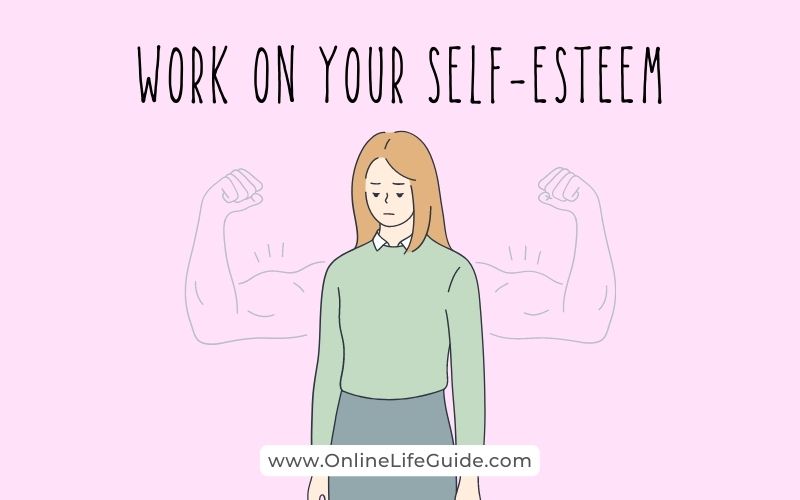
One of the most common personality traits responsible for poor boundaries is low self-esteem. If you want to make the boundary-setting process easier for you, you must start working on your self-esteem.
A lot of relationship issues begin to improve when we start working on our own personal development because it empowers and enables us to handle matters more effectively.
Before you could improve the quality of your relationship with your partner, you must improve the relationship you have with yourself. Start taking care of your health, read good books on self-improvement, get into creative hobbies, start making new friends, or at least start socializing.
Set new goals for yourself and stick to them. Accomplishing your goals (even the smaller ones) and breaking your psychological barriers by challenging yourself will transform your personality in ways you can’t even imagine!
4. Learn to say “No”
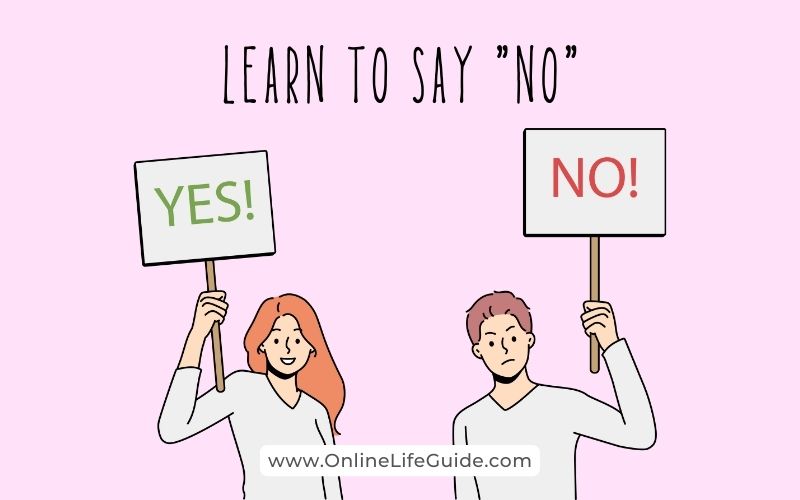
One simply CANNOT set boundaries without turning people down at times, and yes, you may offend or annoy people along the way, which is absolutely fine. They have to learn to respect your boundaries and get used to your refusals.
Saying “no” is a muscle that you have to strengthen with practice. Just like when you build muscle, you don’t go for the heaviest weights or the toughest exercises. You start small and easy, and then you level up.
Start by saying “no” in easy situations where the stakes are low then gradually work your way up to bigger matters and situations.
If you’ve always struggled with saying “no” and handling people’s requests, suggestions, and intrusions, check out my step-by-step guide on the Art of Saying NO, where you’ll learn practical examples of how to refuse without feeling guilty, and reclaim your time, energy, and personal space.
(I know… lots of references to other guides here. Had to mention them because I genuinely feel they’ll help you out.)
5. Seek out Healthy Relationships as a Source of Support
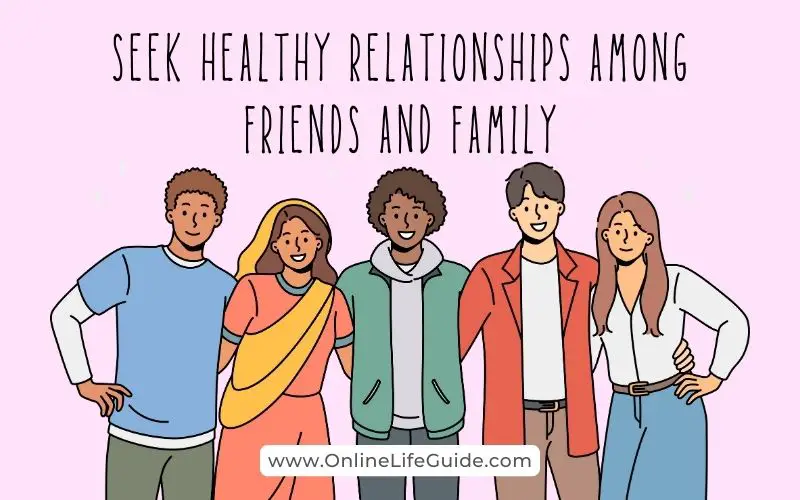
When we are stuck in the bubble of our problems, our judgment of the situation and circumstances becomes hazy making it harder to analyze the situation from an objective point of view and come up with appropriate solutions.
Oftentimes, the well-wishing people around us help us see things from a fresh perspective and gain a completely new understanding of things.
They also help us differentiate between the rights and wrongs, the acceptable and unacceptable, and what is okay and what’s not okay.
It’s important to surround yourself with supportive people who wish you well and are genuinely keen on your well-being. It could be family members, close friends, and even a therapist.
6. Prioritize your Well-being – Leave if you have to
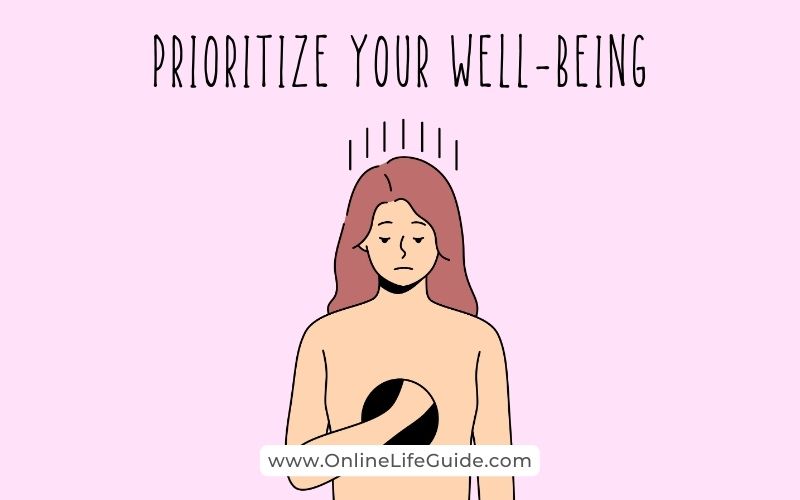
This isn’t an easy step and definitely shouldn’t be on the top of the list of solutions but it becomes especially important when the relationship begins to cause harm to a person’s mental and physical health.
As long as it’s safe to stay in the relationship, I always advocate giving your relationship a fair shot by thoroughly exploring all possible solutions (hence all the detailed guides on this blog).
But there are times when the other person isn’t willing to change at all or put any form of effort into improving the relationship. In such scenarios, ending the relationship becomes inevitable, or else it begins to ruin a person’s mental health.
Always consult your family members or a good therapist before making such a decision.
(Please note that if boundary violation leads to situations where you feel unsafe, it becomes necessary to seek outside help from authorities and family members, and even seek a restraining order, if it gets to that point. Your safety and well-being should always be a priority.)
What’s Next?
If the signs and effects of poor boundaries mentioned above apply to you and you find yourself constantly struggling with boundary setting, here are some guides that you must read:
- Guide to Setting Healthy Boundaries (Read Here)
- What Relationships with Healthy Boundaries Look Like (Read Here)
- 15 Rules for a Strong Relationship (Read Here)
- Signs of Enmeshment in a Relationship + How to Fix (Read Here)
I hope this guide served you well. See you in the next one!






